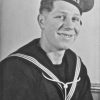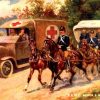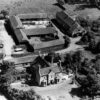War’s pain never went away
Remembering Troopers Harry Richmond Daybell and Frederick Kenneth Bend 2nd World War service
Herbert Daybell
Looking back now it amazes me that my father’s generation went to war in 1939 to fight the German enemy with horses. Like many a farmer’s son he volunteered for a yeomanry regiment, the Sherwood Rangers Yeomanry, and despite tanks having been deployed in the First World War, horses were still a vital part of our fighting force when World War Two broke out.
Other youths of the time from nearby villages also joined up with the local regiments and the group of friends faced whatever was to come together.
Horse regiments were gradually upgraded to tank regiments and those whose experience with animals saw them join cavalry regiments were now made tank drivers. In one of the north African battles my father’s tank was knocked out by a German shell.
It’s difficult and probably really it’s impossible to imagine the adrenalin coursing through the veins of the crew in a tank in the middle of a major battle.
These early tanks were basically metal boxes stuffed full of high explosive ammunition. The uninsulated tank had no suspension and was searingly hot. Hot enough to literally fry an egg on. The ceaseless clanking of the tracks in battle, the drumming of the vibrating metal sides, the shouting of orders, the deafening thump of your tank and others using their cannons built up a heightening of the senses to unbearable levels. Then just when it seemed nothing could assault these senses any more, the most thunderous crash of an enemy shell smashing through the thick armour plates at the front stopped it, literally, in its tracks.
Fortunately the stash of ammo didn’t go up, and again, fortunately our side’s tanks were still advancing, for if they’d been hit whilst in retreat, you’d have been left at the mercy – or otherwise- of the advancing enemy. And their priority would have been to press home their advantage rather than use resources on wounded enemy soldiers.
So my father was dragged out of his devastated tank and taken to a field hospital where two pieces of shrapnel were removed.
To give an idea of the shells impact one of them was a piece of bolt three quarters of an inch across, that had been sheared clean through, complete with the nut still attached that he kept as a macabre souvenir.
The war was a subject my father seldom spoke of and one of the few incidents when I recall it being mentioned was at the amusement arcade at Skegness when my father won a ring from the man who claimed he could guess your weight to within so many ounces or you won one of his rings.
The secret to how the showman guessed so accurately was that he took hold of the arm of each one trying to outdo him as they stepped up onto the scales. By experience the showman could then accurately judge the weight of any individual. My father won because his arm was wasted away having been injured when the tank he was driving in north Africa had been hit by a shell.
He passed my mother the ring and his only comment was that it was the only good thing to have come out of his wartime experiences.
Like so many soldiers who came back from the conflict, he seldom wanted to talk about his experiences, except when he met up with his fellow regiment members at their reunions and bits came out at odd times and in odd ways.
He always had a good appetite and ate everything that was put in front of him: but not crab, which was one of my favourites.
He not only wouldn’t eat it, he hated it being in the house. Out of the blue one day he explained that they’d had to make some landing on a beach that had seen particularly savage fighting and when it was his turn to make his way ashore there were fellow soldiers bodies in the shallows that were seething with crabs eating at the flesh of his dead colleagues.
On another occasion when I was still a young boy, I asked the now seemingly incredibly naive question “Dad did you do anything brave in the war?” There was a long thoughtful silence before he related that there had once been a dead pig in the no man’s land between our lines and the enemies and he’d gone out under the cover of darkness and cut off a leg of pork and brought back for the regimental cookhouse.
I’d heard my father talk of Fred Bend as one of the village colleagues who had been killed in action and didn’t make it back. Fred had been the only son of Mr and Mrs Bend from Easthorpe. Whenever any of the older village people spoke of Fred, they always said how good looking he was. I remember Edna Taylor describing him once as having film star good looks.
One day a local man came to the door and explained to my father that he was the executor for Mrs Bend, Fred’s mother who had recently died. He had with him a cardboard shoebox of old photographs taken during the war. He had known that my father and Fred had been together in the yeomanry and thought he might like to keep the photos as there were no other members of the Bend family left.
As a child I was really excited to have the novelty of sorting through the shoebox and seeing something of foreign countries and tanks in action.
As we began to spread the treasures out on the kitchen table it soon emerged that, naturally, Fred was the main subject of most of the photographs but as we delved on those where my father also appeared, had his face scribbled out in pencil.
Even I was shocked. My father remained silent.
Why, I asked him, had his face been blotted out in this way?
There was a long pause, and I knew there was no point in asking the question again, I just had to wait.
Eventually, he said that Mrs Bend must have done it in despair at knowing that her son would never return whilst, purely by fate, another village son lived on.
That night my father took photographs and the box of letters he had sent back to his mother whenever it had been possible whilst he was stationed abroad, slowly read through them and then one by one threw them on the fire.
I knew no one would ever be able to piece together what had happened in those far off places in later years as far as our family was concerned, but I also knew there was no point trying to dissuade him.
Editor’s note
Many thanks to Herbert Daybell for previewing material from his book manuscript remembering village life in his youth.
A more formal account of Fred Bend, incorporating part of this post, has been added to the Service Biographies.
















No Comments
Add a comment about this page